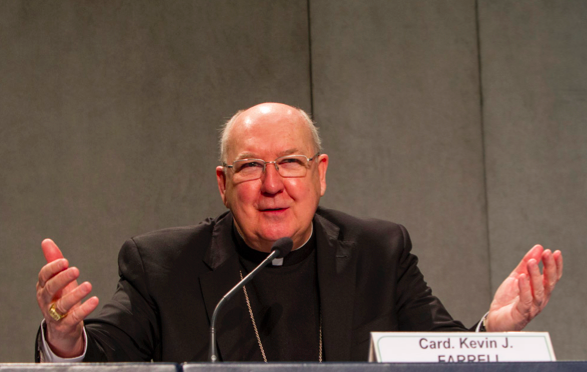War is between arch conservatives and God of Mercy unlimited Church – dr. james kottoor

Opposition to Pope: birth & growth!
 The historical roots of opposition to Pope Francis’ idea of “a God of mercy” started long before the release of his exhortation “Joy of Love” in April 2016. It all began actually on Feb. 20, 2014, when Pope Francis invited Cardinal Walter Kasper to address the cardinals gathered for the first consistory of his new pontificate. Kasper's book Mercy had profoundly impacted Francis and he asked the German cardinal to share his insights with the other cardinals. Among the items Kasper discussed was his conviction that the church needed to revisit its pastoral practice in regard to those Catholics who had divorced and remarried.
The historical roots of opposition to Pope Francis’ idea of “a God of mercy” started long before the release of his exhortation “Joy of Love” in April 2016. It all began actually on Feb. 20, 2014, when Pope Francis invited Cardinal Walter Kasper to address the cardinals gathered for the first consistory of his new pontificate. Kasper's book Mercy had profoundly impacted Francis and he asked the German cardinal to share his insights with the other cardinals. Among the items Kasper discussed was his conviction that the church needed to revisit its pastoral practice in regard to those Catholics who had divorced and remarried.
The conservatives hit back quickly, publishing a book, Remaining in the Truth of Christ, that challenged Kasper's book and proposal. It included essays by such prominent churchmen as Cardinals Raymond Burke, Walter Brandmüller, and Carlo Caffarra. The various essays all struck a common theme: The church's teaching on marriage, they clamed, is "irreformable," based on the words of Jesus in the Gospels, and unchanged for two millennia of Christian life. Burke was again prominent among those voicing his concerns, claiming the discussions and press coverage were being manipulated since discussions within the synod hall at that time were not public.
Irreformable?
CCV had published several reports and comments at that time. Francis was so enamoured of Walter’s presentation of the “new name of our God is MERCY” and Francis’ own provocative inference and question: “If it is not the lost sheep, the most hardened sinners (divorced and remarried in the present case) for whom the Church of Jesus came to seek as the lost sheep? Didn’t the Good shepherd (son of God of Mercy) leave the 99 just and go in search of the lost one? He therefore was saying in effect, there is no sin in this world which is not pardonable, as a counter to the conservative group’s argument that traditional Church teaching on marriage was “irresormable”.
So even before the two Synods started, it was clear that a majority and minority party had emerged, with the majority open to the Kasper proposal. In voting on the final report from the synod, most propositions garnered nearly unanimous support but three paragraphs regarding LGBT outreach and the issue of how to help divorced and remarried Catholics failed to garner two-thirds of the voting prelates, although they did attain a majority.
Dubia & its publication
The final document cleared the two-thirds majority, including those pertaining to a possible opening for the divorced and remarried to return to the sacraments. On November 2016, Brandmüller, Burke and Caffarra, all of whom had contributed to the book opposing the Kasper proposal, joined by Cardinal Joachim Meisner, archbishop emeritus of Cologne, Germany, took the extraordinary step of publishing five dubia, or doubts, that they had regarding Amoris Laetitia. They did it after waiting for months for Francis to clarify their doubts which he didn’t. Since the publication of the dubia, two of the four cardinals — Meisner and Caffarra — have died.
Filial correction of heresy
Once the four conservative, traditional cardinals led by Burke found that their doubts made known to Francis both privately and publicly could not domesticate and force him to speak up, now they collected signatures of sixty-two Catholic academics, researchers, and scholars in various fields from twenty countries and sent a 25 page letter made public on Sept 24th listing seven heresies for the Pope’s consideration and correction. (Read CCV 26/09/2017, Pope propagating Heresy?) The letter had been actually delivered privately at his Santa Marta residence one month ago on Agust 11, 2017. No similar action had ever taken place within the Catholic Church since the Middle Ages, when Pope John XXII was admonished for errors which he later recanted on his deathbed.
This group called their 25 page letter ‘Filial correction’ to hide their hypocrisy and pretence to be better informed and enlightened to parade themselves to be lords and masters empowered to correct and teach an erring Pope teaching ‘heresies’ in his “Amoris Laetitia’, as it happened in the middle ages. (Oh Tempora! Oh Mores!) Oh the morality of the times we live in! even in the sanctuaries of holiness!
Boston Conferenc of Theologians
All these historical and chronological developments have finally resulted in the the two-day Boston Conference Oct. 5-6 just over attended by 2 ardinals, 12 bishops and 24 other invited participants. This meet highlighted two things: 1. “Infantilization of the laity” reducing laity and families, a legacy of the historical colonization and the encyclical, of Pius X, ‘Vehementer Nos’ of 1906, suggesting laity to be content being objects of clerical control to be led (not to lead) to pay, pray and obey. This needs must be buried for good, said the conference. 2. The Boston conference stressed that clerics are called to form consciences, not to replace them quoting Francis; “replacement of conscience is an act of domination, again colonization.”
The details collected above are from many articles published in the NCR and our own CCV to give an overall picture of opposition and its growth to Pope Francis and the torturous journey of ‘Joy of Love’ ever since its publication last November 2016.
A Final Question
A final question is: What impact all this have in India. The exemplary impact is that the Archdiocese of Kolkata concluded a historic Synod, in Sept. 26-30, which was attended by 88 priests, 23 nuns, 37 laymen and 13 lay women, representing Catholics in the archdiocese, about which, Isaac Gomes, Associate editor of CCV from Kolkata wrote an elaborate report and assessment. (Read: CCV, 05/10/2017). Based on these CCV has 4 points for the consideration of Indian bishops. They are the following:
1. Imitate Kolkata at least in conducting a study and Synod on ‘Joy of Love’
2. Give proportionate representation to Laity in diocesan and national synods; they are the church, not the clergy, especially today when it is the Year of the Laity. They are also better informed than the clergy who should keep their mouths shut to listen and learn.
3. Stop infantilizing them, they will just revolt; days of colonialism and over lording is long over.
4. Bow to their commanding conscience; never ever try to replace it with clerical conscience leading to doom, or blind leading the blind.
Will Indian bishops listen and think over these suggestions? If the bulk of them care two hoots for what the Pope says, what can a small fry like CCV expect from them? That is the way CCV feels from its long experience with Indian bishops. They are welcome to live in their heavens or make a hell (we don’t believe in) for themselves. james kottoor, editor ccv.
Please read below US bishops on Amoris Laetitia
Bishops, theologians gather to consider US implementation of 'Amoris Laetitia' – by Joshua J. McElwee Oct 3, 2017
Boston College event to address 'new momentum' of pope's exhortation on family life.
Cover Picture: Cardinal Kevin Farrell, prefect of the Dicastery for the Laity, Family and Life, answers questions March 30 at a Vatican news conference at World Meeting of Families, which will be held in Dublin. (CNS/Robert Duncan)
In five panel discussions over two days Oct. 5-6, two cardinals, 12 bishops, and 24 other invited participants discussed what organizers are calling the "new momentum" Amoris Laetitia gives local bishops to renew their pastoral practices toward families.
Pope Francis' apostolic exhortation on family life, Amoris Laetitia, is perhaps the most hotly debated Catholic church document since Humanae Vitae, Pope Paul VI's 1968 encyclical letter that reaffirmed the church's ban on birth control.
Standout moments in the debate following Amoris Laetitia's April 2016 release include the November 2016 publication of a letter from four cardinals openly challenging the pope over the document and the September 2017 accusation by a few dozen Catholics that the pontiff had even committed heresy in writing it..
But not much public focus has been centered on what the document, known in English as "The Joy of Love," actually says in its 261 pages. Even less attention has been given to how local dioceses might implement its program for bishops and priests to see God's grace at work even in the sometimes-unconventional situations families and marriages face today.
The recently held Boston College addressed that lack of attention. In five panel discussions over two days Oct. 5-6, two cardinals, 12 bishops, and 24 other invited participants discussed what organizers are calling the "new momentum" Amoris Laetitia gives local bishops to renew their pastoral practices toward families.
Jesuit Fr. James Keenan, a theologian at Boston College who is helping organize the event, told NCR the hope for the conference was to "fortify and further the ongoing reception of Amoris in the U.S."
Keenan organized the event alongside Chicago Cardinal Blase Cupich, using the model of an earlier conference hosted at Paris' Institut Catholique by French Cardinal André Vingt-Trois and Msgr. Philippe Bordeyne, a theologian and rector of that institute.
Cupich attended the Boston-area event as also Cardinal Kevin Farrell, who was called to Rome from Dallas by Francis in 2016 to lead the Vati
 can's new Dicastery for Laity, Family and Life. Farrell spoke at Oct. 5 as part of a panel on how the apostolic exhortation addresses those in Western cultures who have become disaffected by authority structures. Keenan said the event will have a particular focus on hearing from those who have been involved with helping the European church better understand and implement Amoris Laetitia.
can's new Dicastery for Laity, Family and Life. Farrell spoke at Oct. 5 as part of a panel on how the apostolic exhortation addresses those in Western cultures who have become disaffected by authority structures. Keenan said the event will have a particular focus on hearing from those who have been involved with helping the European church better understand and implement Amoris Laetitia.
Speakers included German Bishop Franz-Josef Overbeck, who participated in the 2014 and 2015 Synods of Bishops that led to the exhortation; Malta Archbishop Charles Scicluna, who co-wrote a January 2017 document for Malta's priests on how to implement the exhortation in their country; and Jesuit Fr. Antonio Spadaro, a papal confidant and editor of the Italian magazine La Civiltà Cattolica.
Other bishops set to speak at the event include Atlanta Archbishop Wilton Gregory and San Diego Bishop Robert McElroy. Those in attendance were include Santa Fe Archbishop John Wester; Indianapolis Archbishop Charles Thompson; San Bernardino, California, Bishop Gerald Barnes; Cheyenne, Wyoming, Bishop Steven Biegler; and Burlington, Vermont, Bishop Christopher Coyne.
In addition, Keenan said that while Boston Cardinal Sean O'Malley and Philadelphia Archbishop Charles Chaput are unable to attend, both are sending representatives to take part. Among the expected 24 lay participants at the event are some of the most prominent theologians in the U.S., including: Cathleen Kaveny, Richard Gaillardetz, and Hosffman Ospino of Boston College; Julie Hanlon Rubio of St. Louis University; Franciscan Sr. Katarina Schuth of the University of St. Thomas, and Meghan Clark of St. John's University. A handful of press outlets have been invited to report on the proceedings, including NCR.
The Boston conference carries the title "Amoris Laetitia: A New Momentum for Moral Formation and Pastoral Practice." The program states that Francis is "inviting the Church to a renewed process of moral formation and pastoral practice with regard to marriage and family life that is rooted in Sacred Scripture and the Church's faith."
"Implicitly, [the pope] is also envisioning a wider perspective on renewal that has a broader application for the life of the whole Church," it continues. "The foundations are absolutely traditional … but what brings the movement forward is a creative recovery of synodality, listening, accompaniment and discernment."
Farrell's panel on how the exhortation addresses those disaffected by authority is to be the third of the five panels of the conference. The first two are to focus on understanding "the scope, the challenge, and the promise" of the document, and the "newness that priests and laity face" in reading it. The fourth and fifth panels will focus on how Amoris Laetitia engages in a pastoral process marked by discernment and accompaniment, and the challenges the document presents to theologians and pastors.
Making pastors lives 'wonderfully complicated'
Amoris Laetitia was released on April 8, 2016. It was written by Francis following the 2014 and 2015 Synods of Bishops on the family, which each made recommendations to the pontiff after weeks of meetings among hundreds of prelates at the Vatican.
While the exhortation does not explicitly change church teaching, it has been seen as a radical departure from recent decades of pastoral practice. In one ofAmoris' most poignant passages, Francis asked Catholic pastors around the world to let their lives become "wonderfully complicated" in an effort to see God's grace at work, even in situations which might be seen as contrary to doctrinal norms.
The pontiff also called on bishops and priests to set aside fears of risking moral confusion in their efforts to accompany people in difficult family situations, saying pastors must avoid a tendency to a "cold bureaucratic morality" and should shift away from evaluating peoples' moral status based on rigid canonical regulations. Pointedly, Francis said that Catholic prelates could no longer make blanket moral determinations about so-called "irregular" situations such as divorce and remarriage.
"It … can no longer simply be said that all those in any 'irregular' situation are living in a state of mortal sin and are deprived of sanctifying grace," the pontiff stated at one point in the document." It is reductive simply to consider whether or not an individual’s actions correspond to a general law or rule, because that is not enough to discern and ensure full fidelity to God in the concrete life of a human being," the pope wrote later.
"Discernment must help to find possible ways of responding to God and growing in the midst of limits," stated Francis. "By thinking that everything is black and white, we sometimes close off the way of grace and of growth, and discourage paths of sanctification which give glory to God."
The pope also said the church has sometimes had a hard time in the past respecting what lay Catholics discern God to be telling them in their consciences. "We also find it hard to make room for the consciences of the faithful, who very often respond as best they can to the Gospel amid their limitations, and are capable of carrying out their own discernment in complex situations," he stated. "We have been called to form consciences, not to replace them."
Much of the public debate during the 2014 and 2015 synods had focused on how the bishops and the pope might address divorced people who had remarried without first seeking annulments. Church practice has in the past prevented such people from taking Communion.
Francis devoted the eighth of Amoris Laetitia's nine chapters to that question. While the pope did not specifically issue a new law or regulation allowing remarried Catholics writ large to have the Eucharist, he significantly changed the church's stance towards such persons.
The pope called for "pastoral discernment" of individual situations and proposed what he called "the logic of pastoral mercy" in working with remarried persons.Citing Pope John Paul II, Francis put forward the notion of "graduality," meaning that Catholics may sometimes grow toward adherence or understanding of church teaching throughout their lives.
"This is not a 'gradualness of law' but rather a gradualness in the prudential exercise of free acts on the part of subjects who are not in a position to understand, appreciate, or fully carry out the objective demands of the law," stated the pope. "For the law is itself a gift of God which points out the way, a gift for everyone without exception."
"No one can be condemned forever, because that is not the logic of the Gospel!" he exhorted. Francis also said it is possible that those living in "an objective state of sin … can be living in God’s grace, can love and can also grow in the life of grace and charity, while receiving the Church’s help to this end."
In a footnote at the end of that passage that some have taken to mean that divorced and remarried people can now take Communion in some circumstances, the pope said that in some cases such help from the church "can include the help of the sacraments."
"I understand those who prefer a more rigorous pastoral care which leaves no room for confusion," Francis stated later. "But I sincerely believe that Jesus wants a Church attentive to the goodness which the Holy Spirit sows in the midst of human weakness."
Much of the debate since Amoris Laetitia's release has revolved around how different people interpret the footnote about giving divorced and remarried people the help of the sacraments. The Maltese bishops' guidelines said that a divorced and remarried person who has prayed at length and is acting with an informed conscience "cannot be precluded from participating in the sacraments of reconciliation and the Eucharist."
A group of Argentine bishops likewise said in September 2016 that there can sometimes be factors in a divorce that limit the responsibility of the Catholic in question and that, in those cases, "Amoris Laetitia opens the possibility of access to the sacraments of reconciliation and the Eucharist."
But other bishops have said Amoris Laetitia does not open up the possibility for divorced people in new marriages to receive Communion. In July 2016, for example, Chaput issued guidelines stating that remarried people would need to refrain from sexual intimacy if they wanted to take the Eucharist."Undertaking to live as brother and sister is necessary for the divorced and civilly remarried to receive reconciliation in the sacrament of penance, which could then open the way to the Eucharist," said those guidelines.
While Francis has refrained from clarifying exactly what possibilities Amoris Laetitia opens for remarried people, he praised the Argentine bishops' guidelines in a letter later confirmed as authentic by the Vatican. The letter stated that the Argentine prelates had accurately explained with the exhortation taught. "There are no other interpretations," Francis said. [Joshua J. McElwee is NCR Vatican correspondent. His email address isjmcelwee@ncronline.org. Follow him on Twitter: @joshjmac.]















